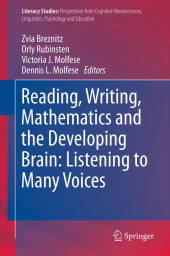 Neuerscheinungen 2014Stand: 2020-02-01 |
Schnellsuche
ISBN/Stichwort/Autor
|
Herderstraße 10
10625 Berlin
Tel.: 030 315 714 16
Fax 030 315 714 14
info@buchspektrum.de |

Zvia Breznitz, Dennis L. Molfese, Victoria J. Molfese, Orly Rubinsten
(Beteiligte)
Reading, Writing, Mathematics and the Developing Brain: Listening to Many Voices
Herausgegeben von Breznitz, Zvia; Rubinsten, Orly; Molfese, Victoria J.; Molfese, Dennis L.
2012. 2014. xvi, 324 S. 24 Tabellen. 235 mm
Verlag/Jahr: SPRINGER NETHERLANDS; SPRINGER 2014
ISBN: 9400797656 (9400797656)
Neue ISBN: 978-9400797659 (9789400797659)
Preis und Lieferzeit: Bitte klicken
This valuable addition to the literature is a comprehensive overview of recent brain imaging research focused on reading, writing and mathematics-a research arena characterized by rapid advances arising from fresh techniques in brain imaging itself.
This valuable addition to the literature offers readers a comprehensive overview of recent brain imaging research focused on reading, writing and mathematics-a research arena characterized by rapid advances that follow on the heels of fresh developments and techniques in brain imaging itself. With contributions from many of the lead scientists in this field, a number of whom have been responsible for key breakthroughs, the coverage deals with the commonalities of, as well as the differences between, brain activity related to the three core educational topics. At the same time, the volume addresses vital new information on both brain and behavior indicators of developmental problems, and points out the new directions being pursued using current advances in brain imaging technologies as well as research-based interventions. The book is also a tribute to a new Edmund, J Safra Brain center for the study of learning Disabilities at the University of Haifa-Israel.
Reading . Chapter 1. Introduction to the Reading and Writing Sections; Victoria J. Molfese and Zvia Breznitz . Chapter 2. Evidence of Dynamic Changes in Brain Processing from Imaging Techniques: Implications for Interventions for Developmental Disabilities; Dennis L. Molfese, Victoria J. Molfese, Krista Garrod and David L. Molfese . Chapter 3. Magnetic Source Imaging: A Suitable Tool of Exploring the Neurophysiology of Typical and Impaired Reading Ability; Roozeh Rezaie, Panagiotis G. Simos, Jack M. Fletcher and Andrew Papanicolaou . Chapter 4. ERP Studies of Reading Disabilities; Peter J. Molfese . Chapter 5. A Model of Brain Activity of Young as Compared to Adult Dyslexic Readers, and their Outcomes from Intervention; Shelley Shaul . Chapter 6. Optimizing Reading Enhancement: Evidence from Brain Research; Olga Chuntonov and Zvia Breznitz . Chapter 7. The Error Detection Mechanism among Dyslexic and Skilled Readers: Characterization and Plasticity; Tzipi Horowitz-Kraus . Chapter 8. Reading in more than one Language: Behavior and Brain Perspectives; Anat Prior .- Writing and Motor Skills . Chapter 9. Spelling Disability - Neurophysiologic Correlates and Intervention; Gerd Schulte-Körne . Chapter 10. The Relationships between Motor Learning, the Visual System and Dyslexia; Itamar Sela .- Mathematics . Chapter 11. Numerical Cognition: From Development to Intervention (Introduction); Orly Rubinsten . Chapter 12. The Beginning of the Road: Learning Mathematics for the First Time; Tamar Ben-Shalom, Andrea Berger and Avishai Henik . Chapter 13. Ordinal Processing of Numerical and Non-numerical Information; Dana Sury and Orly Rubinsten . Chapter 14. Diagnostics and Intervention in Developmental Dyscalculia: Current Issues and Novel Perspectives; Korbinian Moeller, Martin Fischer, Ursula Cress and Hans-Christoph Nuerk . Chapter 15. New Approaches to Teaching Early Number Skills and to Remediate Number Fact Dyscalculia; Liane Kaufmann and Silvia Pixner . Chapter 16. Number Sense in Low-performing Kindergarten Children: effects of a Working Memory and an Early Math Training; Evelyn H. Kroesbergen, Jaccoline E. Van ´t Noordende and Meijke E. Kolkman


